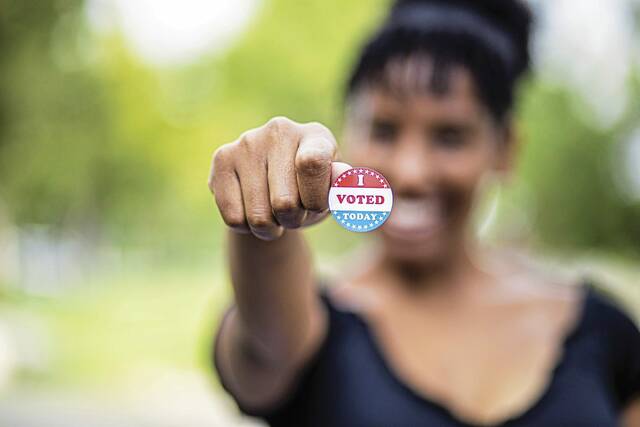https://triblive.com/opinion/bishop-dwayne-royster-black-voters-are-not-a-monolith-break-this-misconception-through-data-genuine-connection/
Bishop Dwayne Royster: Black voters are not a monolith — break this misconception through data, genuine connection

As voters cast their ballots in the 2024 presidential election, there’s still time to rethink the oversimplified strategies used to engage Black voters. Doing so starts with rejecting the false notion that Black voters are a monolith.
This political convenience fails to acknowledge the rich diversity of perspectives, experiences and priorities within the Black community. Many of us are not reached because of this reductive approach to civic engagement, and we fail to build our collective power to make progress on issues that matter most including housing affordability and access, climate, migration, criminal justice and gun violence prevention.
We cannot be architects of a new America without fully understanding or honoring the intracommunity differences that make us beautiful and whole. I’ve seen these nuances firsthand as a pastor in several Black congregations. Identity is a complex and individual experience that cannot be universally defined or categorized. Faith leaders, like myself, have a unique role in relaying the messages of civic inclusion to our communities and the ability to break through the monolithic noise and rhetoric to make genuine connections.
Like any other voter demographic, Black voters make political decisions based on individual, familial and communal factors. However, stereotypes and assumptions can cloud judgment, perpetuating incomplete and inaccurate narratives. To truly engage the Black electorate, we must invest in data and research that capture the complex and nuanced realities within the community, allowing for a more informed and authentic approach to understanding their diverse political views.
The Democracy and Power Innovation Fund, in conjunction with nonpartisan research and civic groups including the Pennsylvania organization I used to lead, POWER Interfaith, recently released preliminary data earlier this month exploring the motivating factors that drive civic engagement across different segments of the Black electorate. The report provides robust research and tools to support organizers in engaging and mobilizing Black people more authentically.
The research found that when Black people feel empowered and believe their vote counts, they are more likely to participate in elections. Conversely, they opt out when they feel powerless or disillusioned by the systems that have often failed them. Among 2,034 registered Black voters and 918 unregistered Black voters surveyed, researchers identified five distinct value clusters amongst respondents, including legacy civil rights (41%), secular progressives (12%), NextGen traditionalists (18%), rightfully cynical (22%) and race-neutral conservatives (7%). Each cluster is based on shared common traits, attitudes and experiences and provides an initial snapshot of the diversity within the Black electorate.
Take the rightfully cynical group, for example. These are folks who did not see much difference in their neighborhoods between the Obama and Trump administrations. They hold unfavorable views of both Democrats and Republicans, have a low propensity to vote and feel disillusioned by their ability to impact government and policy. They are “rightfully cynical” because their perspectives and opinions are rooted in experiences with systems and institutions that have failed them and their communities. Folks in this cluster could be moved by authentic messages from trusted messengers — such as faith and other communal leaders — and additional research could shed light on the pathways to activate this undervalued electorate.
African American Christian and Muslim congregations in Pennsylvania are reaching the rightfully cynical cluster through a soul food dinner campaign hosted by legacy civil rights voters, empowering those skeptical of systems with a platform to discuss those concerns and experiences. The goal of the dinner is to provoke conversation within the multiple clusters of Black voters about a shared vision and plan for the community through civic participation, all while sharing delicious soul food. This people and community-first civic engagement program has already shown great promise, representing a future where all voices are heard and data brings the community together.
Research like this provides a clearer picture of why Black people choose whether or not to engage, how they engage and what role they see the government playing in their lives based on their lived experiences, values, and identities. When we invest in this political infrastructure, we can see and understand the incredible, vast differences in the Black electorate in how people participate in democracy and think about democracy through the data.
Stereotypes and misconceptions are holding us back from achieving our collective power. Civic leaders can expand the electorate to include underestimated and underrepresented high-opportunity voters in the Black community through data-driven, genuine outreach and engagement. Through additional research and leveraging this wider lens approach, we can continue to refine our understanding of Black voters in this country.
Bishop Dwayne Royster is executive director of Faith in Action, a global faith-based grassroots organizing network. He previously served as executive director of POWER Interfaith in Pennsylvania, a federation of Faith in Action, and has pastored Black congregations in Philadelphia and Washington, D.C.
Copyright ©2026— Trib Total Media, LLC (TribLIVE.com)
